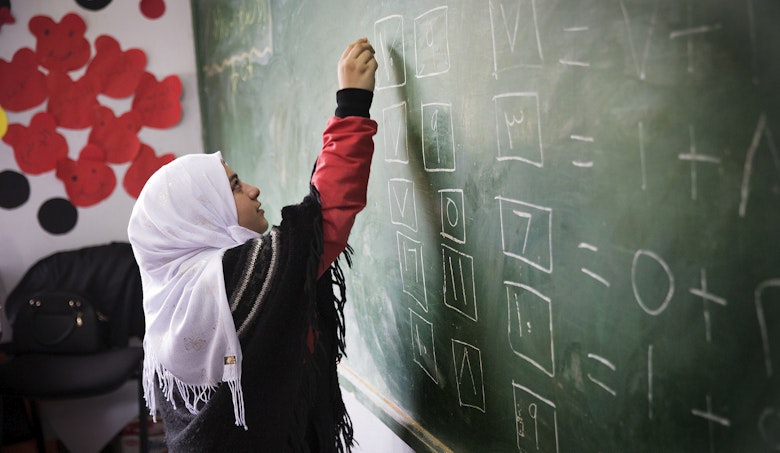Lebanon
Latest news
Annual report 2023
In 2023, we collaborated with many stakeholders to work with us towards our ultimate goal; stopping child expl…
The Global Research Agenda
On February 1 2024, the Terre des Hommes Netherlands Global Research Agenda was launched, which will guide our…
Call for immediate ceasefire and humanitarian support in Gaza and the West Bank
Terre des Hommes is providing humanitarian and development assistance in Gaza and the West Bank through its In…
Annual report 2022: concrete results for children
Thanks to the support of donors, in collaboration with partners and the commitment of volunteers and staff, Te…
Tailor-made educational support for Bilal in Lebanon
Five-year-old Bilal* is beaming in the classroom of the Early Childhood Education (ECE) programme. He is one o…
Picturing a childhood on paper
Art, in any shape or form, can transform a child’s life. For 13-year-old Walid, drawing has become an essentia…
Refugee Louay finally has access to education
Louay, 6, from Syria was born prematurely. Due to lack of oxygen at birth, he developed a condition that left…
Eager to learn
Ribah is 14 and wants to become a chef in the future. Maysa is 12 and dreams of becoming a school principal. N…
Eager to learn, no matter the circumstances
Picture this: a young girl with an eagerness to learn and a mother who dedicates herself to making this happen…
Annual report 2020
Without a doubt 2020 is the year of the corona pandemic. And yet there is much to be proud of!
Annual Report 2019
Together we make the difference. A fitting title for our annual report 2019. We are proud of the results we re…
Annual report 2018
Thanks to your support, in 2018 we were able to work on tackling child labor in the mica mines in India, child…
Our work in Lebanon
Millions of children from Syria have grown up with war. Many have fled violence, from civil war first and then the Islamic State. Along with their families, they often live in overcrowded camps around neighbouring countries, such as Lebanon.
War leaves its mark deeply. Many children suffer trauma. They are long away from school. They miss a normal life – without violence. Camps and villages where they seek refuge are rarely prepared for so many newcomers. With our local partners, we fight for better care and protection of these children.
We provide emergency aid in Syria itself. We provide a safe place for children who have fled to Lebanon. They receive special psychosocial help and education in a child-friendly space.
Together with their families and communities, they can process their tough experiences and learn to deal with their new circumstances. They can also make up missed school lessons.
In Lebanon, we take a stand to protect and educate vulnerable children who have fled war. Join our fight.
Psychosocial care and education
Children fleeing war are extremely vulnerable. They are at extra risk. For example, to be traded or exploited or to have to get married as a young girl.
Often these children have experienced bad things. And they ended up in a foreign country. They miss their normal life. Their school. Their boyfriends and girlfriends.
It is important that they are well protected and helped. Trauma that is not treated can cause major problems later on. Not going to school as a child means finding work later on. Parents who flee with their children often have a hard time. Finding your way in overcrowded camps or in strange villages is difficult. That is why we not only help the children, but also the families.
We advise on where they can request help from the government. But especially how they and their children can best deal with their new situation. This is called psychosocial help.
Fortunately, much has improved for children on the run in Lebanon in recent years. They can now often go back to a normal school. Where that is not possible, we provide emergency aid and education.
In our child friendly spaces, safe places where children can play, we also offer extra help to children who are struggling. They can vent in creative ways. Drawing, painting, acting. It helps to process bad experiences. Join the fight. Protect children on the run in Lebanon.
We help as many children as possible
Lebanon now has about three times as many refugees as its official inhabitants. Half of them are children. This increase creates major risks. We fight for better protection of refugee children.
For example, we have been offering emergency aid since 2012. In Syria itself, but also in Lebanon. There are major shortages there. Food, cooking utensils, blankets and winter clothing are essential items.
We are also expanding our projects to protect more children from the consequences of war. With child friendly spaces for a safe place, education and psychosocial help.
Formal and informal education
In recent years, the Lebanese government has been able to do a lot for refugee children. With the help of local and international partners, they can now return to school for normal, formal education.
There is often little to do for the children outside of school. This puts them at risk of being exploited. That is why we create places where the children are safe. Where they can play and discharge. This form of informal education is important. Refugee children often have a learning delay. They learn to learn again in a playful way. The language, for example, which is different from home.
This allows them to join their regular school better and to make new friends. They get more structure in their lives. This makes them feel a little better.
Our programmes
Our partners in Lebanon
Together with experienced partners we are working towards a world without child exploitation, where young people can feel safe today and better about tomorrow. Join our fight.
Contact us
Business hours

